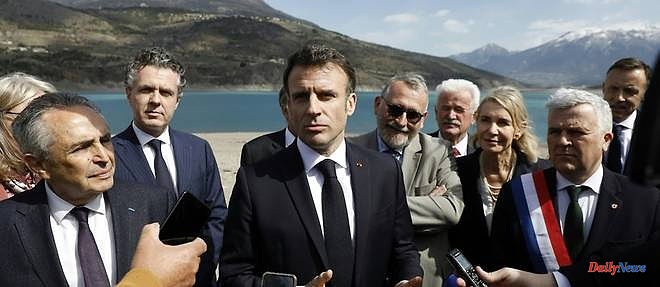Traveling to the largest freshwater reservoir in Western Europe, Emmanuel Macron wanted to prepare France for the droughts caused by global warming and announced Thursday a "sobriety plan" on water for all economic sectors. and individuals, while sparing farmers.
The president announced a target of 10% wastewater reuse by 2030, while France is very behind on this subject. Fearing "situations of great stress next summer" on this resource threatened by global warming, he welcomed on the shores of Lake Serre-Ponçon an objective representing a saving of "3,500 bottles of water per French person and per year" .
A few days after the violent demonstration against the artificial water reservoir in Saint-Soline (Deux-Sèvres), he validated the usefulness of this type of solution, while saying that he wanted to condition their use on energy-saving practices. water and pesticides. A consideration deemed not very credible in practice by the Peasant Confederation, at the forefront with environmental groups against these "mega-basins" accused of monopolizing a common good.
“It is not a question of privatizing water or allowing some to monopolize it,” replied the president, five days after the clashes in Sainte-Soline between demonstrators and gendarmes. Thousands of people had "simply come to make war", commented Mr. Macron.
Expected at Lake Serre-Ponçon by some 200 demonstrators against the pension reform, who chanted "Macron resignation" supervised by the CGT and the Peasant Confederation, Emmanuel Macron estimated that this challenge "does not prevent (him) from going to meet the French.
"He diverts attention, he knows how to do it very well, from the real subjects", regrets Julie, a 40-year-old protester from the neighboring town of Guillestre.
Two demonstrators were arrested before the arrival of the head of state.
The same day, traveling in the Alps (south-east) Emmanuel Macron returned to the clashes in Sainte-Soline denouncing "thousands of people who had simply come to wage war".
Meanwhile, in Lyon, Nantes, Lille, Paris and other cities in France, hundreds or thousands of people gathered on Thursday evening, most often peacefully, near prefectures, "against the repression in Sainte-Soline and "police violence" in the demonstrations on Saturday, noted AFP journalists.
In Paris, the gathering of 4,500 people according to the police headquarters, turned in the evening into wild demonstrations in small groups in the heart of the capital. Seven arrests took place in these wild processions, according to a report from a police source at 10:30 p.m.
"A sobriety plan on the water" will be requested "from each sector" from "here in the summer", warned Emmanuel Macron, calling for everyone to take responsibility and not only agriculture, the main consumer of water. water via irrigation (more than 2 billion m3), practiced only on 7% of cultivated areas but most often in summer, when the resource is scarce.
"We are not asking farmers for an additional effort" in this plan, welcomed their minister Marc Fesneau on Thursday, who had given up accompanying the president to be in Angers at the congress of the FNSEA, the majority union, very satisfied with having escaped constraints to lower his levies.
On the side of environmental NGOs, the need to reinvent the agricultural model to adapt it to climate change invoked by the president is welcomed, but the WWF deplored a lack of concrete details and Future generations the absence of strong measures against chemical pollution .
The France nature environment federation (FNE) pointed to the "timidity" of the plan on pesticides and fertilizers. She welcomed the course of "sobriety", which is however an update of the conclusions of the Assises de l'eau of 2019, still far from having been implemented.
After a historic heat wave and drought in the summer of 2022, the winter in France was particularly dry with a record 32 days without rain, which did not allow the water tables to be replenished and exposed the fragility of a temperate country, yet rich in water, faced with the consequences of global warming.
For the efforts to be made, the president cited "energy, industry, tourism, leisure" but individuals will also be asked to limit their consumption, using an "EcoWatt of water" on the model of the instrument set up to reduce electricity consumption.
They will be encouraged to do so by the generalization in France of a "progressive and responsible pricing" of water, already announced in 2019 but remained at the experimental stage. The "first cubic meters" will be "invoiced at a modest price, close to the cost price", but "beyond a certain level, the price per cubic meter will be higher".
In another very consuming sector, the president announced an investment program to adapt nuclear power plants to climate change, which are the third largest consumers of water in France (12%) because of their need for cooling.
The flow of rivers could drop by 10 to 40% in France around the middle of the century, according to the Bureau of Geological and Mining Research (BRGM).
bur-bl-vl-fff/lum/ico/pta/pa
03/30/2023 23:45:11 - Savines-le-Lac (France) (AFP) - © 2023 AFP












